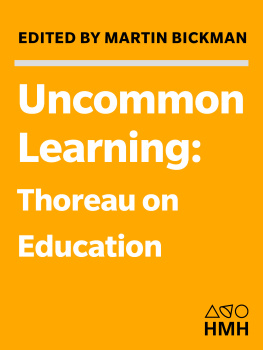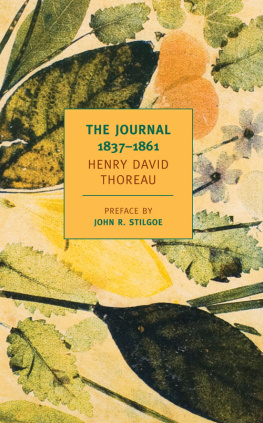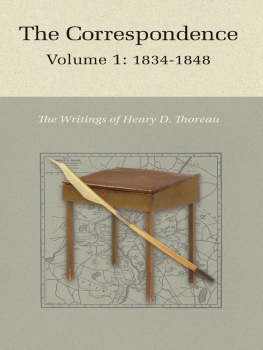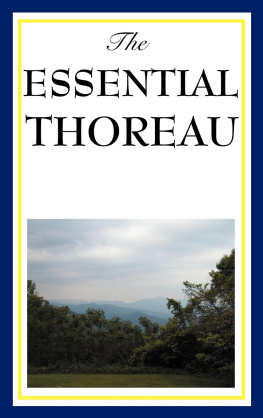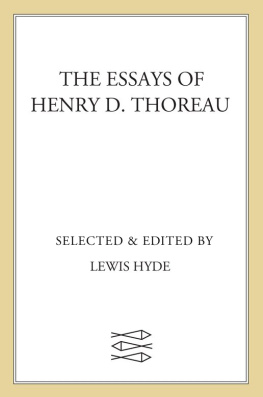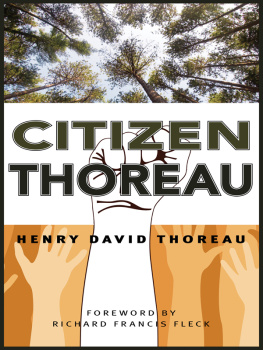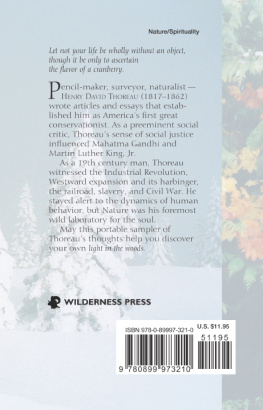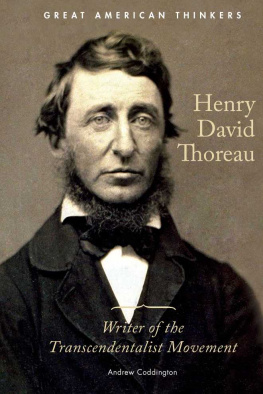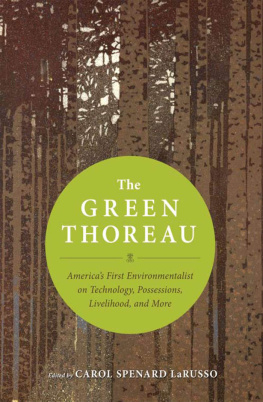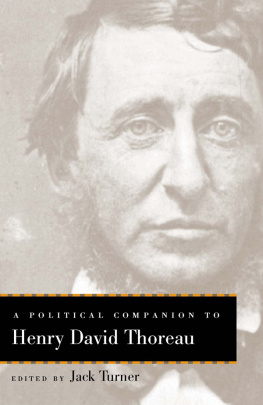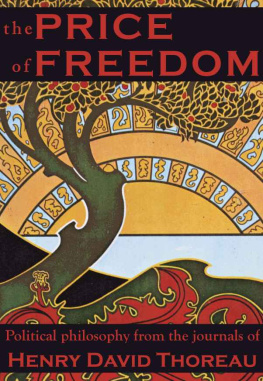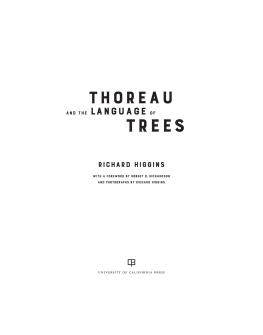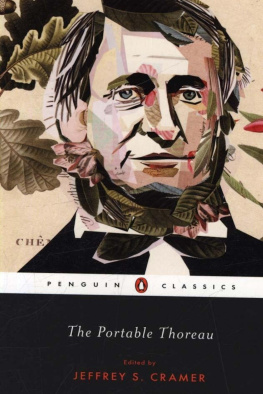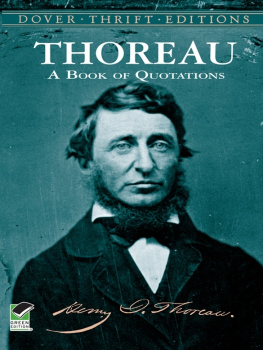Henry David Thoreau - Uncommon Learning: Thoreau on Education
Here you can read online Henry David Thoreau - Uncommon Learning: Thoreau on Education full text of the book (entire story) in english for free. Download pdf and epub, get meaning, cover and reviews about this ebook. year: 1999, publisher: HarperCollins, genre: Science. Description of the work, (preface) as well as reviews are available. Best literature library LitArk.com created for fans of good reading and offers a wide selection of genres:
Romance novel
Science fiction
Adventure
Detective
Science
History
Home and family
Prose
Art
Politics
Computer
Non-fiction
Religion
Business
Children
Humor
Choose a favorite category and find really read worthwhile books. Enjoy immersion in the world of imagination, feel the emotions of the characters or learn something new for yourself, make an fascinating discovery.
- Book:Uncommon Learning: Thoreau on Education
- Author:
- Publisher:HarperCollins
- Genre:
- Year:1999
- Rating:4 / 5
- Favourites:Add to favourites
- Your mark:
- 80
- 1
- 2
- 3
- 4
- 5
Uncommon Learning: Thoreau on Education: summary, description and annotation
We offer to read an annotation, description, summary or preface (depends on what the author of the book "Uncommon Learning: Thoreau on Education" wrote himself). If you haven't found the necessary information about the book — write in the comments, we will try to find it.
It is only when we forget our learning that we begin to know, Thoreau wrote. Ideas about education permeate Thoreaus writing. Uncommon Learning brings those ideas together in a single volume for the first time.
Uncommon Learning: Thoreau on Education — read online for free the complete book (whole text) full work
Below is the text of the book, divided by pages. System saving the place of the last page read, allows you to conveniently read the book "Uncommon Learning: Thoreau on Education" online for free, without having to search again every time where you left off. Put a bookmark, and you can go to the page where you finished reading at any time.
Font size:
Interval:
Bookmark:
Copyright 1999 by the Thoreau Society
Foreword copyright 1999 by Jonathan Kozol
All rights reserved
For information about permission to reproduce selections from this book, write to or to Permissions, Houghton Mifflin Harcourt Publishing Company, 3 Park Avenue, 19th Floor, New York, New York 10016.
hmhco.com
Library of Congress Cataloging-in-Publication Data
Thoreau, Henry David, 18171862. Uncommon learning: Thoreau on education / edited by Martin Bickman ; foreword by Jonathan Kozol.
p. cm(The spirit of Thoreau)
ISBN 978-0-395-94797-5
1. Thoreau, Henry David, 18171862Quotations.
2. EducationQuotations, maxims, etc.
I. Bickman, Martin, 1945-. II. Title. III. Series: Thoreau,
Henry David, 18171862. Spirit of Thoreau.
PS 3042. B 35 1999 99-12985
818.309dc21 CIP
eISBN: 978-0-547-34587-1
v2.0418
Selections from volumes 15 of Thoreaus Journal
are from The Writings of Henry David Thoreau, Witherell, E., ed.
Copyright 1972 by Princeton University Press. Reprinted
by permission of Princeton University Press.
J ONATHAN K OZOL
I T IS the destiny of many of our greatest writers and most interesting thinkers to be read selectively and used exploitatively in later years by those who arent content to celebrate their glories but instead attempt to package them in ways that will accommodate contemporary fashions or sectarian beliefs.
In the case of Thoreaus views on education, this is a particularly dangerous temptation. His ideas on childhood and education and his actual experience as a schoolteacher offer a diverse display of marvelously bold, inventive, and sometimes deliciously iconoclastic practices and points of view, as well as some that are remarkably old-fashioned and traditional. Almost all have been appropriated by a wide diversity of pedagogic partisans over the years to reinforce and, frequently, romanticize their own most cherished ideologies.
Thoreaus emphasis, for instance, upon lived experience as an essential element of educationone that is more fruitful, often, than the benefits to be derived from formal methods of instructionhas been used repeatedly to justify entirely random and unstructured educational approaches in which discipline and rigor are eschewed, book learning scorned, and the role of educator whitded down to the diminished point where teachers are reluctant to assign a book, insist on its completion, or demand some evidence that children have in fact learned something from its reading.
It is salutary, therefore, to remind ourselves that Thoreaus pedagogic views, as dedicated as he was to freedom and to individual and practical experience for children and adults alike, did not exclude some rigorous instructional approaches that contemporary libertarians have tended to dismiss and even ridicule. It is also easily forgotten that Thoreau himself, who rewroteWalden seven times before he had it in a form that satisfied his sense of artistry, worked with a steadfast discipline and purposeful intentionality on almost everything he did. This willingness to labor hard and long, and to insist on the same kind of diligence from pupils, is not always recognized by those who, in our own day, sometimes claim to wear his mande. The notion that a child often learns by doing is confused too frequently with the calamitous idea that children never learn by reading or by listening or writing and rewriting in the same painstaking way that Thoreau did.
Thoreau, admittedly, would now and then refer to formal regimens of education with a lot of likable irreverence; but in the work he did with children he used common sense and held them to the same exacting standards that good teachers try to upholcf in the classroom even now. Walter Harding notes, for instance, that when Thoreau and his brother ran a school in Concord, pupils would be questioned as to what they wished to learn. When a student answered that he wished to study Latin, Greek, and mathematics, he would then be told hed be successful only if he would obey our rules and do what we require. The schools curriculum was rigorous, according to the students. In the morning, one boy wrote his father, I recite Solid Geometry.... Geography comes next.... Grammar comes next. In the afternoon, he said, Mr. Henrys classes studied algebra and Latin. In Latin, he reported, they were studying the life of Alcibiades, irregular verbs, and conjugation in the grammar. Small errors in their Latin grammar drew stiff reprimands from Mr. Henry, as a student recollected later.
What now are known as field trips to the countryside surrounding Concord were a part of the curriculum as well. Children studied plants and animals firsthand and not exclusively through the use of texts. Thoreau delighted in this aspect of his teaching, and some of his most invigorating writing draws upon the hours that he spent outside the classroom with his pupils. But he also was a hard taskmaster in traditional respects and tended to be rigid... in exacting good work, as one of his students noted later. The overall curriculum that he enforced was not at all rhapsodic or unstructured but a great deal like the course of study found today in classrooms of the most respected public schools, some of whichhistoric Boston Latin School, for instancehe would find exceedingly familiar.
Thoreau is paradoxically appropriated nowadays by very bitter critics of the public schools, many of whom are ideologically conservative, who notecorrectlythat some of his criticisms of the role of government in education are consistent with their own. But for all his independent spirit and his jubilant defiance of collective obligations, he espoused the morally commanding view that social orders must provide an education of all children and must do so in collective ways, by which he also made very clear that he meant public education. For all the rich and lovely inconsistencies within his published work and journals, his belief in public education comes through with a glowing and persistent eloquence.
In the long run, it is healthy to remind ourselves that Thoreaus most abiding legacy to educators, whether at the grade-school level or that of the university, lies not in an isolated phrase or passage on specific practices of teaching. It is the spirit of the man, the freshness and the merriment, the sheer delight he takes in mischievous self-contradiction, the defiant humor, and the ultimately irreducible morality of his existence that remain the gift of joy and courage he has left to us.
The greatest damage we could do to this perpetually energizing gift is to imprison it in any deadening container of sectarian opinion. His words would stubbornly denounce us if we sought to use them in this way. I desire to speak somewhere without bounds, he insisted in some of the final words of Walden; he managed to succeed in this as only a few writers of his era did and as too few have managed to do since. It is his boundlessness that has survived the dustiness of decades. If we leave him free to wander without boundaries, it seems safe to say that hell continue to delight, infuriate, inform, and educate his fellow citizens and fellow human beings for centuries to come. To let him stand for what he wasa face of bronze, as he once put it, held to expectationsis perhaps the only way to honor his tenacious independence and to prove ourselves his students in a way that will not utterly dishonor the best lesson he has left us.
J ONATHAN K OZOL , author of a number of prizewinning books on childhood and education, continues to read Thoreau with teenage students.
M ARTIN B ICKMAN
Thoreaus relation to education as an institution has been problematic. He entered the teaching profession early, as an undergraduate, and left it a few years later, when he closed the private school he had conducted with his brother. Although, as we shall see, there were external reasons for this action, Thoreaus departure from teaching also resulted from disillusion with the conventional classroom, a growing sense that it prevented learning rather than fostering it. Also, placing the focus where it really should be, he increasingly came to feel that it is strange that men are in such haste to get fame as teachers rather than knowledge as learners (10 March 1856,
Font size:
Interval:
Bookmark:
Similar books «Uncommon Learning: Thoreau on Education»
Look at similar books to Uncommon Learning: Thoreau on Education. We have selected literature similar in name and meaning in the hope of providing readers with more options to find new, interesting, not yet read works.
Discussion, reviews of the book Uncommon Learning: Thoreau on Education and just readers' own opinions. Leave your comments, write what you think about the work, its meaning or the main characters. Specify what exactly you liked and what you didn't like, and why you think so.

